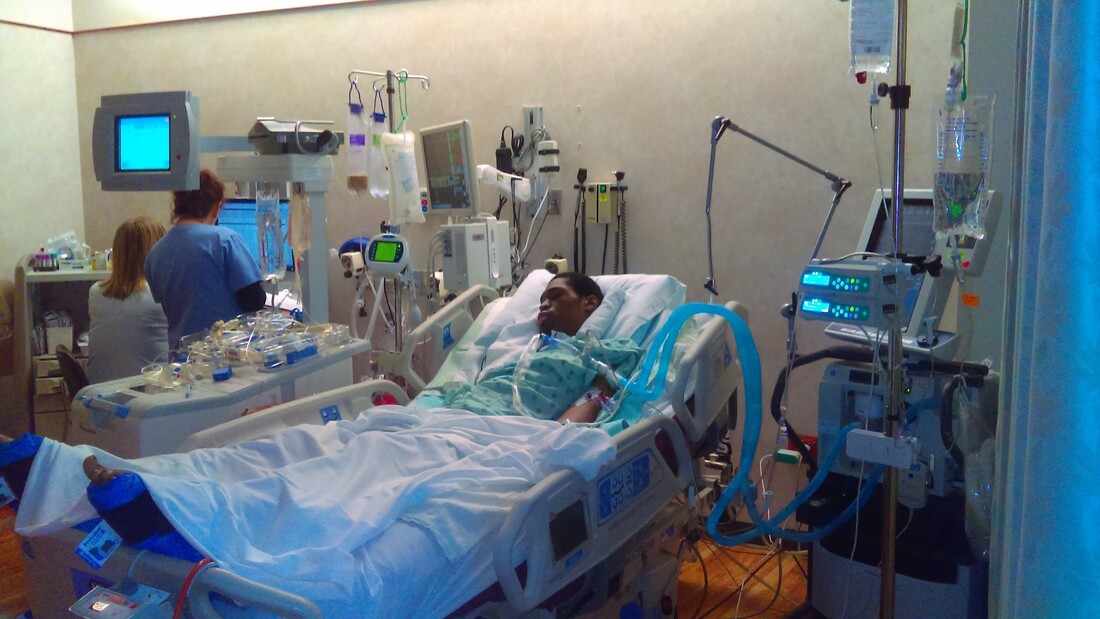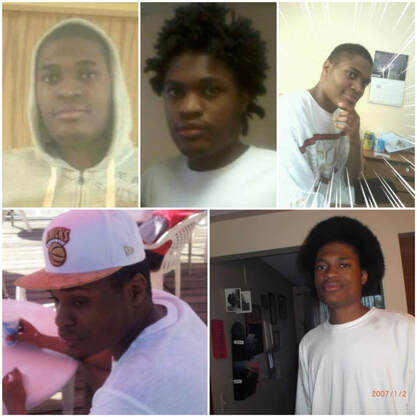|
www.canmichigan.com
Author: Noni Lovechild, February 4, 2022
Musaalih's Struggle: Dying Before Death The worst thing about schizophrenia is that it erases the person you used to know. The teen that used to love to dress, his Jordans and clothes had to match. The teen that brought a homeless friend home and asked if he could stay with us. No one would think of the young man that cared about others anymore, his illness shadowed his personality. The son I knew before was gone. When his illness overtook him or he was in psychosis (as it is referred to in medical terms), no one including me wanted to be around him sometimes because when he had an episode he was a danger to himself and to others. This is a mother's perspective but situations described are facts to how his life and death happened. Musaalih Kerr suffered from schizophrenia from the age of 16 until he died at the age of 25. He was born in Detroit, Michigan but lived in Toronto, Ontario with his dad and brother until the age of 9 when he came back to live with me full time. He was loved by his Canadian family and myself and his two other siblings in the U.S and spent summers and holidays in Michigan. Once he moved to America full time, he attended special education classes in Berkley Public Schools. Criminalization of Mental Illness Around the age of 16, he started talking to an invisible person as if he could see what no one else could. He started acting violently, breaking things. One day I came home from work, ketchup was on the walls in the kitchen. I called the ambulance. Musaalih had multiple hospital stays. Too many to count, but when he pulled a knife on his brother I called the police and they weren't very understanding. He did not have a knife when they arrived but they said he ran five feet and charged him with resisting arrest. I didn't understand how a person who was in a psychosis could be charged with resisting arrest. He was placed in Children's Village and I was billed. I did not care about the bill if he got help but a judge sent him home after a week. A social worker saw us leaving when I told her he was released and she said "Oh no," like she didn't think it was a good idea. When I saw the same social worker as he was now 17 and in and out of adult court, she said that she saw it coming in Children Village. I worked in the office of a major health care provider; and, like most folks, knew nothing about the law so I felt intimidated in the courtrooms with the legal mumbo jumbo talk. When the court appointed lawyer suggested that my son accept one plea deal after another, I felt he had no other options from resisting arrest, so we agreed. Although numerous hospitals said he was incompetent the court always said he was competent as if they had what no medical expert has, a cure for schizophrenia. He sometimes was sentenced to probation after months in jail. Do the system really believe that a mentally ill person can fulfill probation? He was in and out of jail for years, going round and round in a system that wasn't working because it didn't offer what he needed, long term commitment in a mental hospital. The Untimely and Unexplained Death of Musaalih Musaalih Kerr died in 2016 after being neglected in Oakland County jail. His cause of death is listed as trauma to the spine but I never received any answers from the jail as to how it happened. I felt that they didn't care because jail is not a place for the mentally ill. They weren't equipped to handle him. I just know he walked into the jail after being arrested at a group home for incapacitated adults after assaulting another resident. A group home where the residents lived alone.
Although the police knew it was a group home for the mentally ill, they did not take Musaalih to a hospital to be evaluated...nope, straight to jail. If he was having a seizure or in psychosis he was put in jail in that state and left to starve to death. After he died a social worker at the jail told me that he refused his medicine as if we expect the mentally ill to make sound decisions. He collapsed in jail and stopped breathing. He was shocked back to life and put on life support long enough for the jail to say he didn't actually die in jail but jail is where he last breathed on his own. How did I find out that my son was on life support? I went to my son's court date and he wasn't there. Outside the heavens had opened and the sky was dark grey with thunder and lighting. I will never forget that day. I would never see the light of his smile again. I didn't know the storm that day was a sign as I left the court in the heavy rain. I called the jail and was told he's in the hospital. I emailed the Oakland County Sheriff and he agreed that I could visit my son in the hospital for one hour. Naively thinking he acted up in jail and they may have sent him to a hospital for mental health issues, I wasn't prepared when I was instructed to go to the Intensive Care Unit. I was shocked to see him on life support with machines and tubes keeping him alive. He was a quadriplegic, paralyzed from head to toe, but he was awake. Just two beautiful eyes staring at me. Although he couldn't move, so there was no chance of him escaping, his leg was shackled to the bed. The two police officers in his room were laughing and joking about a football game on the TV. He never left the hospital or breathed on his own again. The jail said that there were no cameras in the area he was kept so there were no answers I asked the prosecutor to drop the charges so that I could be with him. She agreed and on the next visit the two police officers were not there. A mentally ill young man was kept where there are no cameras, it didn't make sense. I talked to several lawyers: Fieger, Morrison, Solomon and one more but they said without a smoking gun like a video, no lawyer would open a case. Michigan's Failing Mental Health Care System The question I am posing is did the services he received address the needs of his illness or did it fall short? I understand my son's case was difficult and like some schizophrenic persons sometimes his episodes were violent. When his illness didn't take over his mind he was well liked with hopes and dreams like any other young person. I am not advocating that violent mentally ill persons shouldn't be taken off the streets. I am advocating for the Sate of Michigan to be proactive instead of reactive. How can we as a State be more proactive? There is only one solution, one answer: a state hospital. Would we rather channel some of our tax dollars to have a safe long-term facility for the mentally ill or do we want our schools and communities to be unsafe? Because I am sure not having a facility is driving up the crime rate. Do we continue risking the chance of someone we love running into a mentally ill person on the streets or at school that should have been committed if a facility was available? My heart goes out to my son's victims and thankfully no one was killed or seriously hurt by him during his psychotic breaks. I made the mistake of removing him from a nursing home in 2014. He was put off a greyhound bus and placed in an Illinois State hospital and later a nursing home, which was a miracle. His story was featured on "Dan Rather Reports: Bus Ticket to Nowhere". The show reported about Nevada putting the mentally ill on buses and sending them out of town. (Musaalih went to Nevada after one of his numerous bouts in jail). After he was released from the state hospital in Illinois he was placed in a nursing home which speaks volumes that he was treated with more compassion in Illinois than his home State of Michigan. After six years of him begging me to not let him die in a nursing home because he was too young to live in one, I used my heart and not my head and brought him back to Michigan. A year later he was dead. I own this mistake of bringing him back to Michigan and live with it everyday. Lake Park Nursing Home where he lived had a program where residents could get their own apartment but he could not qualify with a warrant hanging over his head in Michigan for probation violation and could not get disability checks with a warrant. I wanted to get his legal trouble over so he could get more services but I failed to realize Michigan did not see a sick young man but an African American criminal. He had to serve time in jail after coming back to Michigan. After his release he was placed in group homes, where he could go and come as he pleased. I told the court that he was in a locked nursing home in Illinois and needed a secured facility but was told there weren't any places available. Michigan's State-Funded Neglect: The Group Home System The group homes took his bridge card but I always had to use my money to take him food In one of the homes his clothes were stolen. I saw with my own eyes that the group home industry in Michigan is just another hustle for some owners. Not any real care for the residents. I have a video of my son in one group home (shown above) where he was left alone with no food and no other clients or staff. I complained to adult services but the owner was given a heads up so when she was inspected, a few can goods miraculously appeared and a few other clients were moved to the house for the inspection. I was dismissed as the lying parent. After I saw group homes weren't working for my son; he was getting arrested from the group homes I tried everything in my power to have him recommitted but was told Michigan doesn't have a State Hospital or long-term facilities. So he had about 30 short-term stays at different hospitals. I think the longest stay the insurance would pay for was 30 days. A social worker at one of his many hospital admittances told me that in Michigan most schizophrenic persons are in prison. What we refuse to see is that in order for them to get to prison there had to be a victim or victims. As a society if we don't care about the mentally ill, shouldn't we at least care enough to prevent anyone from being a victim? Why do we care about the victims after the fact instead of being proactive in getting those that need to be committed off the streets before a crime is committed. Are we satisfied calling the mentally ill monsters after the fact? Being happy that it wasn't our child or family member hurt in a crime like a school shooting this time? I was so adamant that my son not be on the streets. that I refused to pick him up from one hospital stay hoping that they would do what Illinois did and find him a safe place. My punishment was loss of guardianship. His punishment was death after the system that took over his care failed him. When a parent or family member knows that their loved one is a danger there is nowhere to turn in Michigan. What's the point in having a mental health system today that doesn't work? I am always given the same answer, former Governor John Engler closed the state hospital. Although my son's legal guardian told me, as if it's a well kept secret, that there is a place in upstate Michigan. My guess is that, if true, it is only for some and definitely not those from the inner cities. Nonetheless, he said he would get Musaalih placed there. It took a few months but someone called and asked for my son. When I said he was dead...they hung up. I always had this feeling that it was the facility the court appointed lawyer guardian mentioned. Mental Health To Prison Pipeline I feel black teens with mental illness are just sent to jail. They are thrown away. When it's time to build prisons we have no problems getting funding. Money is always available. Why can't we take a portion of this money and invest in building a State Hospital for the mentally ill? This would reduce the crime rate dramatically. We are quick to use words like monster after a tragedy involving a mentally ill person but don't want to make changes to keep them and our communities safe.
1 Comment
Manuel Franco
12/22/2023 12:42:06 am
I just want to say Thank You to everyone who supported me through the years. My name is Manuel Franco, New Berlin, Wisconsin. My story of how I won the Powerball lottery of $768.4M is a bit of a tale. I have been playing Powerball tickets for 6 years now since I turned 18. I bought my first ticket on my 18 birthday. I was feeling very lucky that day because I had contacted Dr. Odunga Michael to help me with the winning Powerball numbers. I really had that great great feeling that I looked at the camera wanting to wink at it. I only did a tiny part of it and trusted him. He gave me the numbers after I played a couple other tickets along with it for $10. I checked my ticket after the winnings came online and saw the numbers were correct including the Power play. I screamed for about 10 minutes because it felt like a dream. I had won $768.4M. You can check my winning testimony with the lottery officials just with my name search. Thank you Dr Odunga. Well, his email is [email protected] and you can also call or Whats-app him at +2348167159012 so you guys can contact him
Reply
Leave a Reply. |
Deborah Mitchell2016 Wayne State University Alumni - Bachelors of Science in Social Work, social services professional and Registered Social Work Technician. Human service background since 2007 which includes medical case management and service navigation for the indigent population, outpatient mental health counseling for SUD disorders with comorbidities (experienced in medication-assisted and social model treatment modalities), supportive employment and job development for mental health consumers, and structured living domicile management. Archives
July 2024
Categories
All
|






 RSS Feed
RSS Feed